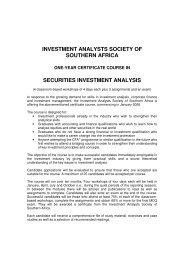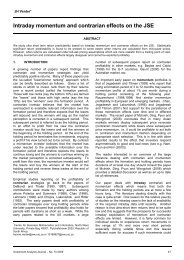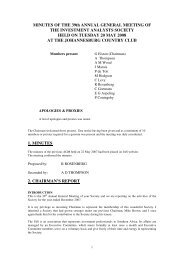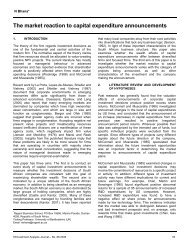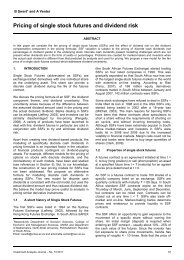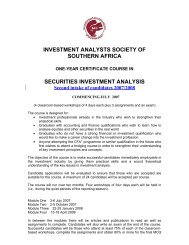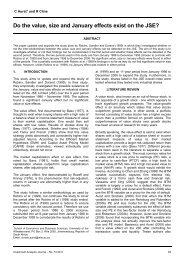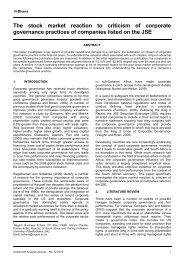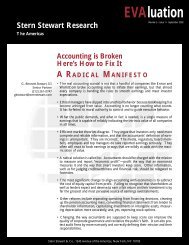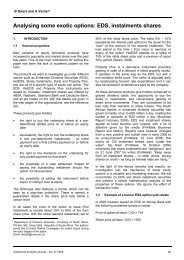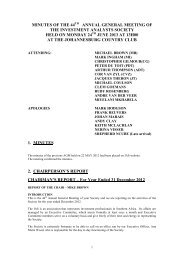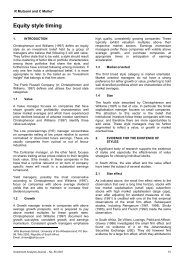The Investment Analysts Journal Number 63 - 2006
The Investment Analysts Journal Number 63 - 2006
The Investment Analysts Journal Number 63 - 2006
Create successful ePaper yourself
Turn your PDF publications into a flip-book with our unique Google optimized e-Paper software.
This issue in brief<br />
<strong>The</strong> value of analysts’ consensus recommendations: Evidence from South African brokerage houses<br />
This study investigates the value of analysts’ consensus recommendations on firms listed on the JSE from March<br />
2000 to April 2003. <strong>The</strong> equally weighted return performance of analysts’ consensus buy, hold and sell<br />
recommendations as well as the effect of transacting on changes in those recommendations is assessed. Raw<br />
returns, market-adjusted returns and risk-adjusted returns are examined.<br />
It is found that if an investor strictly follows analysts’ consensus recommendations, only the buy recommendations<br />
result in significant abnormal returns as estimated under a two-factor arbitrage pricing theory (APT) model. <strong>The</strong><br />
hold and sell recommendations yield insignificant results under all measures of performance. Furthermore, the<br />
number of sell recommendations is very small representing only 3% of the sample. Examining the effect of<br />
changes in recommendations, over a two-month holding period shares with a downgrade from a hold to a sell or<br />
from a buy to a hold achieve significantly negative alphas. In contrast, the abnormal returns of the upgrade<br />
portfolios are not significantly different from zero. It appears that investors can benefit to a greater extent by acting<br />
on downward changes in analysts’ consensus recommendations than on the level of recommendations<br />
themselves.<br />
<strong>The</strong> effect of corporate divestments on shareholder wealth: <strong>The</strong> South African experience<br />
This study investigates the effect of voluntary sell-offs on the share returns of 58 sell-offs involving companies listed<br />
on the JSE during the period 1995 to 2001. Sell-off announcements have a positive effect on the shareholder<br />
wealth of both buyers and sellers. <strong>The</strong> cross sectional analysis reveals that prevailing company underperformance<br />
and focusing on fewer business segments are the only significant factors related to increase in shareholder wealth.<br />
<strong>The</strong> vastly different financial performance between the buying and selling companies suggest that sell-offs enable<br />
the transfer of resources from poorly performing and unfocused companies to those companies providing a higher<br />
value to the assets acquired.<br />
Book-to-market ratio and returns on the JSE<br />
An inspection of the relevant literature reveals the need for the exploration of the ability of the book-to-market<br />
(BTM) ratio to explain stock returns across all stocks on the JSE, within a multi-attribute framework in the style of<br />
Fama and French (1992). <strong>The</strong> individual effect of the BTM ratio on returns is investigated, and is found to be<br />
significant. <strong>The</strong>n the question of whether the BTM ratio subsumes the role of other attributes, and furthermore, if it<br />
contributes to the size/PE model derived by van Rensburg and Robertson (2003) for explaining cross-sectional<br />
returns on the JSE over the same period are examined.<br />
Mean reversion on the JSE<br />
This study examines the existence of mean reversion of share returns on the JSE over the period 1983 to 2005.<br />
This is tested for by tracing the cumulative excess monthly returns of winner and loser portfolios of shares traded<br />
on the JSE for the first time using data corrected for survivorship bias. <strong>The</strong> winner and loser portfolios are based on<br />
the top and bottom 35 shares ranked in terms of their price to earnings ratios at the portfolio formation point. <strong>The</strong><br />
positive results are consistent with the overreaction hypothesis for the JSE.<br />
Troubling long term trends in the South African retirement fund system<br />
Concern is being expressed world wide about the outlook for state retirement funds. In many countries this concern<br />
is one of public policy. In South Africa a situation has developed where payments out of the industry exceed<br />
contribution funds flowing into the industry and have done so since 1993. It is only the return on investment<br />
incomes that generates increasing returns for the industry. This paper takes these trends as its starting point and<br />
analyses the outlook for the South African Retirement Fund Industry based on long term trends using econometric<br />
analysis. Three scenarios are developed to test the outlook for the industry. Under a ‘business as usual’ scenario<br />
there will continue to be a net outflow of funds although the gap between outflows and inflows narrows. This could<br />
continue until 2018 when financial outflows will be matched by financial inflows. An optimistic scenario reinforces<br />
these trends and under this scenario inflows will match outflows by 2011. However, under a pessimistic scenario<br />
the gap between financial inflows and outflows simply continues to widen.<br />
4 <strong>Investment</strong> <strong>Analysts</strong> <strong>Journal</strong> – No. <strong>63</strong> <strong>2006</strong>



